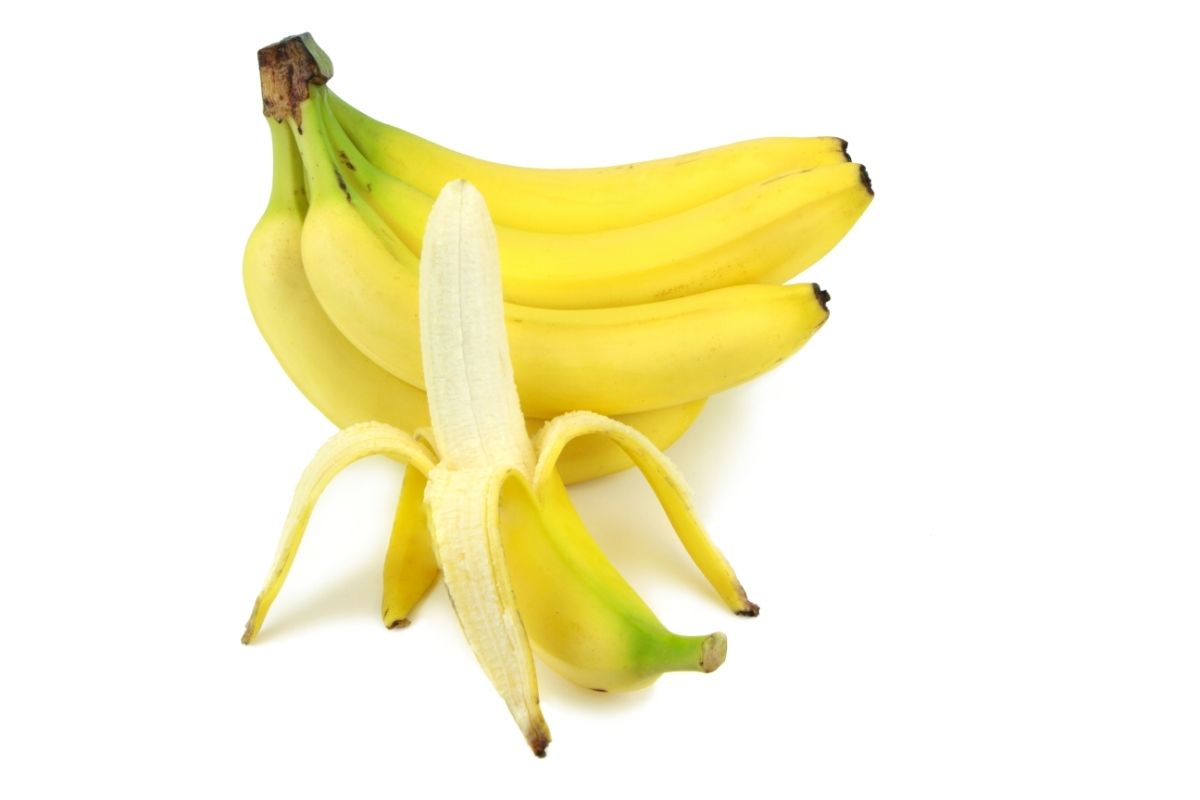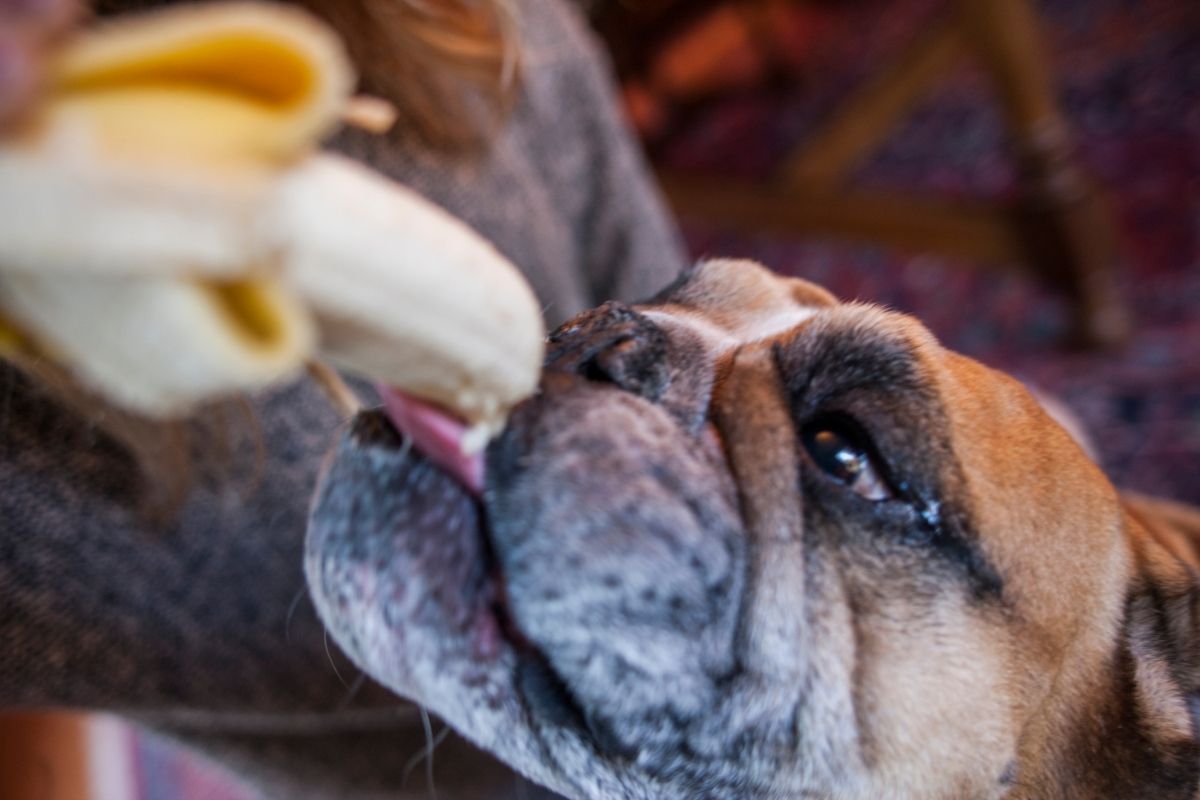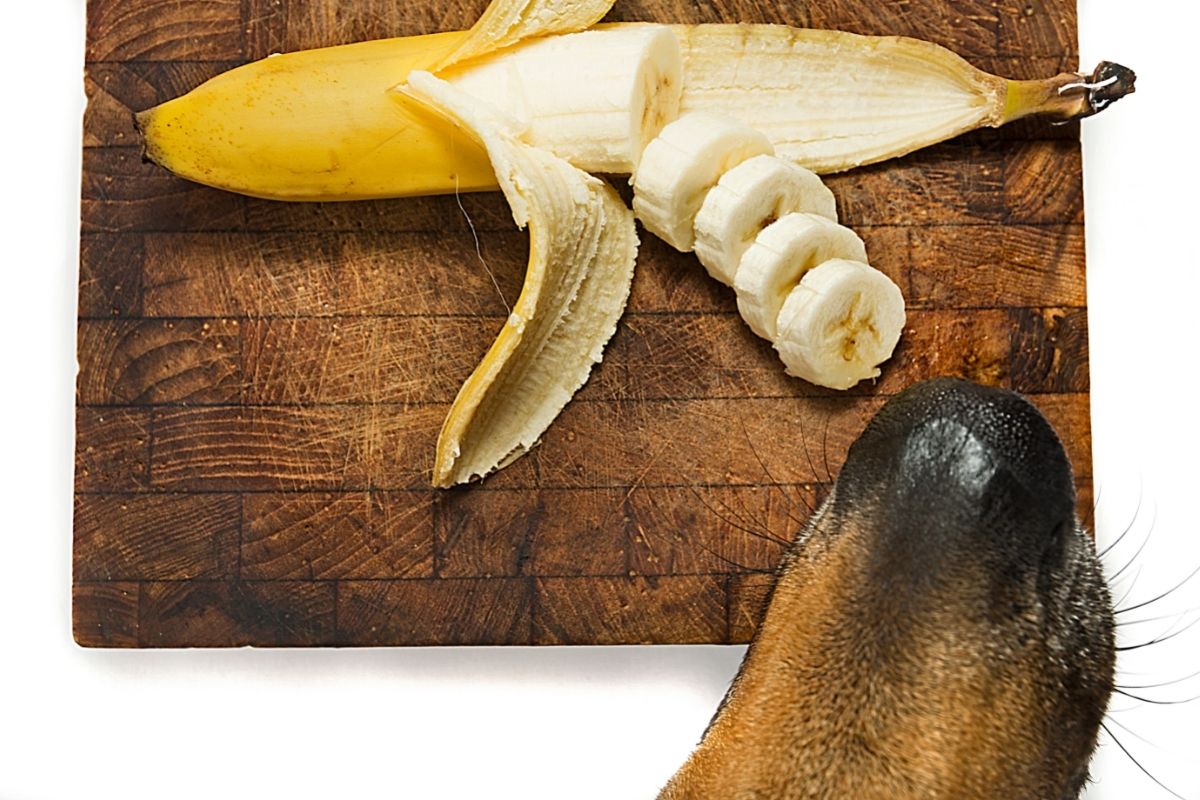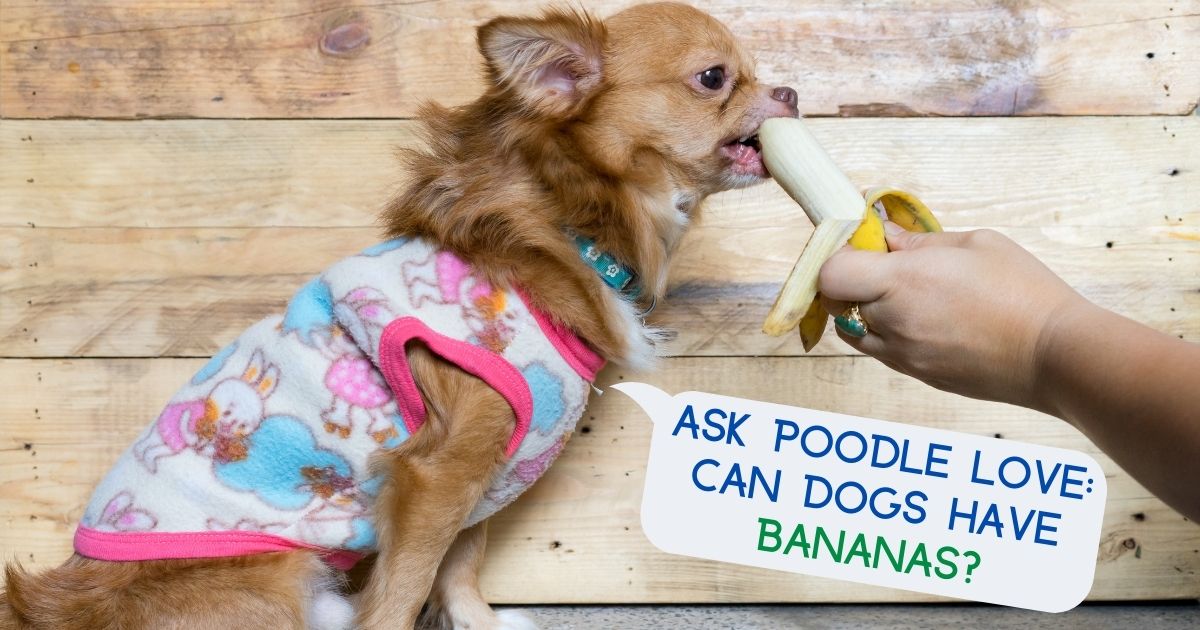Dogs and Bananas
Bananas are the ideal on-the-go snack because they are tasty, fill you up, and come in their own convenient wrapper. So, can dogs have bananas? Yes, bananas are a tasty treat for your dog. Unlike other fruits that may contain toxic components, every part of a banana is safe for your dog to eat.
You need to know how and when to feed this fruit to your dog without causing digestive upset.

Can Dogs Have Bananas?
Dogs can eat bananas which are a great low-calorie treat for dogs when they eat in moderation. They contain a lot of potassium, vitamins, biotin, fiber, and copper. Bananas are low in cholesterol and sodium, but because of their high sugar content, you should give them as a treat rather than as part of your dog’s regular diet.
So, can dogs eat bananas? The answer is yes!
Are Bananas Good for Dogs?
It is important to note that every dog, just like humans, requires a balanced diet. Therefore, your dog’s diet should consist of balanced dog food 90% of the time. However, just like people, dogs enjoy a special treat now and then, and as pet parents, it feels good to provide them with a nutritious snack.
Dog treats are a fun way to reward and motivate your dog, and fruits and vegetables are ideal for this. Bananas are an excellent choice if you’re looking for a healthy fruit treat. Aside from being delicious, bananas are a low-cost fruit available all year. It also comes in its own packaging for convenience when you and your dog are on the go!
This sweet fruit is high in essential vitamins and nutrients such as potassium, magnesium, vitamin C, vitamin B6, and biotin, all of which are beneficial to your dog’s overall health. Bananas are also high in fiber and low in fat and cholesterol, making them superior to packaged dog treats containing unnecessary fats or additives.
Let’s take a closer look at the benefits of the vitamins and nutrients in bananas to see how they contribute to your dog’s health:
- Fiber: Bananas are high in fiber, which is beneficial to your dog’s digestive system. Fiber moves food through the digestive tract, aiding in relieving constipation, diarrhea, and some blockages that can occur.
- Vitamin C: A potent antioxidant that strengthens your dog’s immune system.
- Potassium: Promotes healthy kidney and heart function, increases bone density, regulates fluid levels, and aids muscle development.
- Magnesium: Promotes healthy bone growth while also assisting the body in making better use of vitamins and minerals.
- Biotin: A vitamin that promotes healthy skin, coat quality, and muscle development.
- Vitamin B6: A coenzyme that is essential for brain and body functions. It maintains fluid balance, protein synthesis, hormone regulation, and neurotransmitter support in your dog’s body. Bananas are both healthy and convenient, but they are also high in sugar, which, if consumed in excess, can lead to obesity and diabetes. This risk is reduced by keeping track of how much your dog eats. Having said all these, are bananas good for dogs? Yes, they are, but when dogs eat them in moderation.
Can Puppies Eat Bananas?
It can be tempting to feed our puppies some of our favorite foods. This can be a way to bond with them and please them, and treats can aid in learning commands and tricks. Plus, those big, hopeful, brown puppy-dog eyes are hard to resist. Simultaneously, we want our growing dogs to be strong and healthy. Unfortunately, some human foods, such as candy and grapes, are poisonous to dogs.
It’s always a good idea to do your homework before introducing new foods to your pet, such as asking your veterinarian, “can puppies eat bananas?”. In this case, we have answers for you. So don’t worry if your dog ate banana peel off the floor or if you couldn’t help but give them a piece of yours.
Bananas are considered safe human food for puppies by veterinarians, so it’s okay if your pet eats a slice or two. In addition, some experts believe they are a good substitute for other high-fat or high-sodium dog treats that you may be used for training. Just make sure to peel the banana because that part of the fruit can give your puppy a stomach ache.
You want your puppy to be as healthy as you are, so you might wonder if feeding them bananas is beneficial for them as well. Of course, bananas are more of a treat, but potassium may help heart and kidney health, and fiber can keep the digestive tract running smoothly. This is according to some veterinarians.

How Much Banana Can a Dog Eat?
Bananas are popular among dogs. However, giving them large sums can cause complications. Because of their high sugar content, bananas should only be served as a treat and never as a substitute for a regular meal. A general rule of thumb is that large dogs can eat 1/2 a banana per day, while small dogs should only eat two to three small pieces per day.
Puppies require special diets to support their growth and development, so consult your veterinarian about using bananas as treats and how much your puppy can consume.
If your dog consumes an excessive amount of banana, it may experience stomach upset, and you’ll want to keep an eye on its poop. You will realize there is constipation if your dog is straining to poop. Also, a blockage could form if your dog ate peels.
Gastrointestinal issues would be a more serious issue requiring immediate veterinary attention. Too many bananas can also cause an overload of potassium in your dog’s blood if it has kidney or diabetes problems. This would manifest as weakness, disorientation, or even collapse.
Your veterinarian is familiar with your dog’s health and can advise you on the use of bananas as treats.
Can Dogs Have Banana Peels?
No, dogs should not eat banana peels for a variety of reasons. Banana peels are not toxic, but they are difficult for your dog to digest due to their high fiber content. In addition, if your dog eats a banana peel, you run the risk of causing a blockage in the bowels.
This is the same reason why people don’t eat banana peels, even though they are high in nutrients and fiber, both of which are beneficial to your diet. When a dog eats something, it digests it three times faster than a human.
They have a small intestine that takes up less total volume within their digestive tract, allowing food to move more quickly through this section.
What Should You Do If Your Dog Consumes a Banana Peel?
There’s no need to panic if your dog ate banana peel by accident. The amount of peel your dog ate is the source of the problem. Keep an eye on your dog for any signs and symptoms that indicate a more severe issue. Some dogs may not experience any negative consequences from eating a banana peel, but they probably have strong stomachs.
Symptoms of Eating a Banana Peel
- Trembling.
- Lethargy.
- Whimpering or crying.
If your dog vomits, keep an eye on them to see if they are still in pain. If symptoms of discomfort persist for more than a few hours, contact your veterinarian.
Symptoms of an Intestinal Blockage
- Vomiting that persists.
- Diarrhea.
- Appetite loss.
- Bloating.
- Body clenching.
- Whining and evident dissatisfaction.
If your dog exhibits signs of bowel obstruction, you should contact your veterinarian as soon as possible to avoid an intestinal rupture, which can result in death.
Keep banana peels out of your dog’s reach, so they don’t get ingested, especially if you feed your dog bananas because the peel smells like a tasty treat. Also, after nibbling on a peel, your dog may discover that they dislike the bitter taste.
On the other hand, some dogs are not picky and eat almost anything. Keep in mind that puppies are more likely to consume something they shouldn’t because they eat whatever is within reach.
How to Feed Your Dog Bananas
Consult your veterinarian before feeding bananas to your dog. They can advise you on the appropriate amount for your specific dog based on their dietary requirements and weight.
If your vet gives you the go-ahead, you can feed bananas to your dog in various ways. Here are a few of our favorites:
- Freeze them, peel them, and cut them up for a refreshing frozen treat for your dog. These are especially refreshing on a hot summer day, and they’re straightforward to make.
- Make a mash out of them and mix them into your dog’s food. Your dog may enjoy the sweet flavor and a change of pace from their usual meal.
- Smush them together and stuff them into a toy, KONG, or puzzle feeder. This will provide mental and physical stimulation for your dog while reducing boredom.
- Combine them in a recipe for a treat. What about introducing peanuts! Can dogs have bananas and peanut butter? Yes, but consult a vet first.
- Can dogs have dried bananas? The answer is yes. Dried bananas (banana chips) are convenient when your dog needs a quick energy boost. This is another way to feed bananas to your dog. Even though they are safe for your pet, most commercially available banana chips contain many sugar and preservatives. So, if you’ve been wondering if dogs can eat dried bananas, the answer is yes. However, we recommend dehydrating bananas yourself using a dehydrator or your oven.

A Quick Banana Dog Treat Recipe
Banana Dog Treats Made at Home
Many dogs enjoy the sweet, starchy flavor of a plain banana, but if you’re feeling ambitious, you can make this tasty treat yourself. You don’t need to do any baking!
Ingredients
- A fully ripe banana
- A scoop of peanut butter (make sure it doesn’t contain xylitol first)
- A mild cheese slice
- A food processor
- A fillable toy, such as a KONG
Instructions
- In a food processor, combine the banana, peanut butter, and cheese until smooth consistency.
- Freeze it after smearing it on the toy.
When Are Bananas Bad for Dogs?
Bananas, like other fruits, contain natural sugar. However, too much sugar of any kind can lead to weight gain, resulting in other health problems. The majority (90 percent) of your dog’s daily calories should come from dog food, with the remaining ten percent coming from treats.
Can dogs have bananas for diarrhea? Some people believe that eating bananas will alleviate symptoms of digestive upset such as diarrhea. However, bananas aren’t a cure-all for dogs with diarrhea or constipation. Rather than giving your dog more bananas, monitor his food intake and gradually reduce the amount to see what it tolerates.
Contact your veterinarian if diarrhea and other symptoms do not disappear within 24 hours. Furthermore, if dogs consume too many bananas in one sitting, the high fiber content can cause constipation, and some dogs have difficulty digesting bananas. You should not feed the banana peel to your dog. The peels are not poisonous, but they are difficult to digest.
There is a chance your dog will be allergic to this type of food. If you notice any of the following symptoms of an allergic reaction: swelling, hives, difficulty breathing, sneezing, coughing, or other symptoms, stop feeding your dog bananas and contact your veterinarian immediately.
That being said, your puppy’s regular food is the most crucial part of their diet and all they require. So make sure any treats, such as bananas, don’t fill them up so much that they can’t eat their kibble.
Because 90 percent of your dog’s daily calories should come from its regular commercial or homemade food, limit your large puppy to half a banana per day and your small dog to a few pieces. If your dog develops a stomach ache after eating bananas, it is best not to give them anymore and consult a veterinarian.
